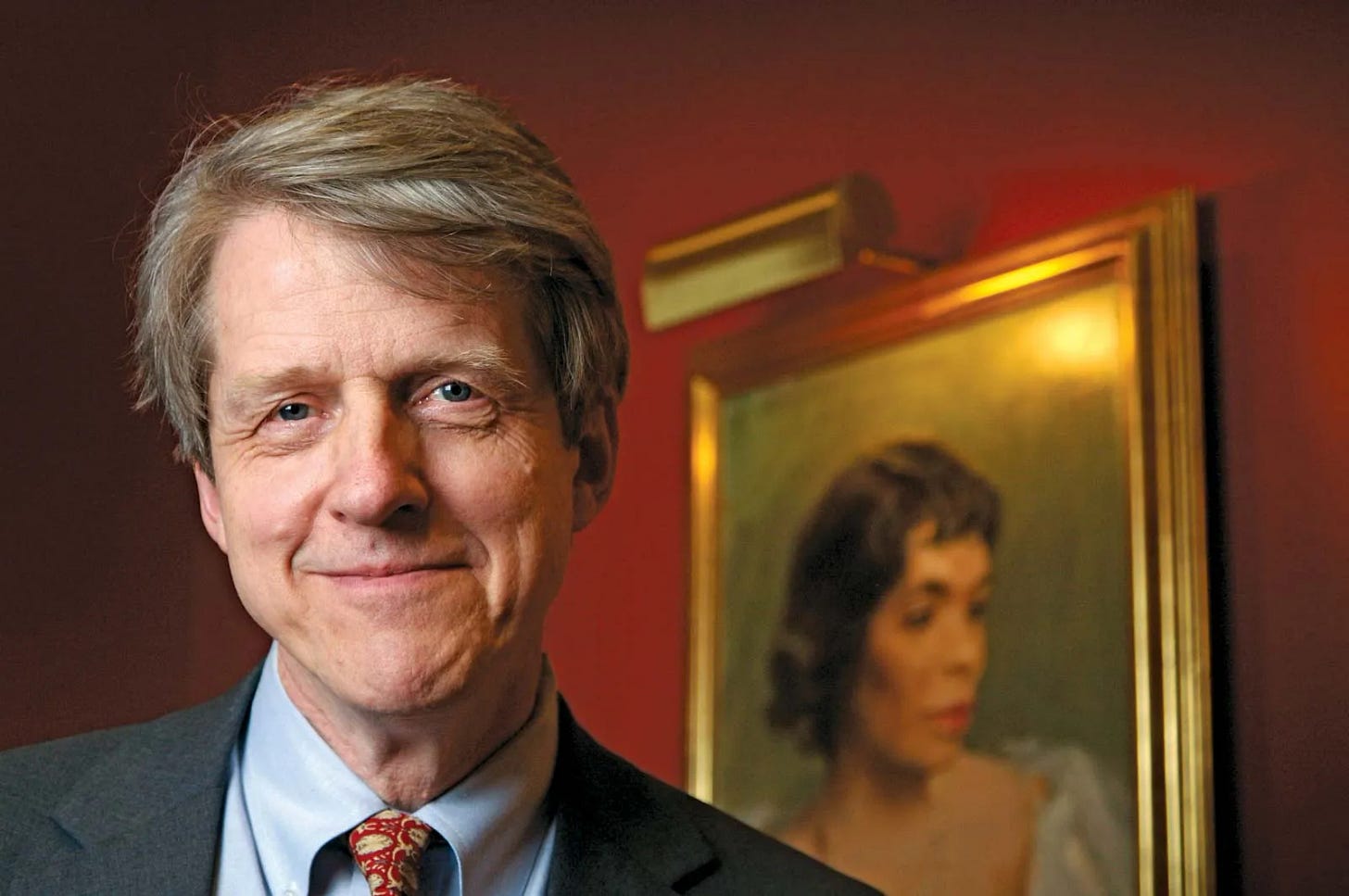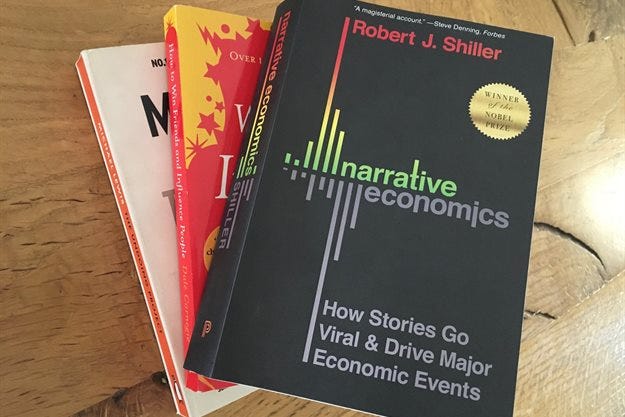Weaving the Threads of Economic Narratives
In the world of economics, few individuals possess the same level of expertise and influence as Professor Robert Shiller. Renowned for his groundbreaking research and exceptional work in the field, Shiller has been at the forefront of exploring the intricate relationship between narratives and economic behavior.
Born on March 29, 1946, Robert James Shiller grew up with a keen interest in understanding human behavior and its impact on the world of finance. A native of Detroit, Michigan, he developed an early fascination with both economics and psychology, ultimately leading him to pursue higher education in these fields. Shiller earned his Bachelor of Arts degree from the University of Michigan in 1967, followed by a Ph.D. in economics from the Massachusetts Institute of Technology in 1972.
Shiller's academic career spans several prestigious institutions, but it is his long-standing association with Yale University that has truly cemented his legacy. Since joining the Yale faculty in 1982, he has served as the Sterling Professor of Economics, a position he still holds today. Throughout his tenure, Shiller has made significant contributions to the understanding of asset prices, behavioral finance, and the role of narratives in shaping economic outcomes.
One of Shiller's most groundbreaking theories is the concept of "irrational exuberance," which he introduced in the late 1990s. This theory challenged the prevailing notion that financial markets are always efficient and rational, highlighting the influence of human psychology and narratives on market behavior. This work earned him international acclaim and established him as a leading figure in the field of behavioral economics.
In 2019, Professor Shiller further solidified his expertise in the realm of narratives with the publication of his highly anticipated book, "Narrative Economics: How Stories Go Viral and Drive Major Economic Events." In this seminal work, Shiller explores the role of popular narratives in driving economic fluctuations, arguing that stories and the emotions they evoke can have profound effects on economic behavior.
"Narrative Economics" presents a captivating framework that illustrates how narratives spread contagiously through society, affecting individuals' decision-making processes and, consequently, shaping economic outcomes. By examining historical episodes such as the Great Depression, the 2008 financial crisis, and even the impact of viral outbreaks, Shiller provides valuable insights into the powerful forces at play in the narrative economy.
Professor Robert Shiller's contributions to the field of economics have not only advanced our understanding of market behavior but have also shed light on the intricate interplay between narratives and economic outcomes. Through his extensive research, groundbreaking theories, and influential book, "Narrative Economics," Shiller has left an indelible mark on the discipline.
By recognizing the pervasive influence of narratives and their ability to shape economic events, Shiller's work reminds us of the need to consider the role of human psychology and societal narratives when analyzing financial markets. With his continued dedication to unraveling the mysteries of the narrative economy, Professor Robert Shiller remains an invaluable source of knowledge, offering profound insights into the ever-evolving world of economics.
Recently, I had the privilege of engaging in an in-depth interview with Professor Shiller, where we delved into his book, "Narrative Economics," and explored his remarkable background and work experience.
Excerpts from the Interview :-
Q1 ) In your book, "Narrative Economics: How Stories Go Viral and Drive Major Economic Events," you delve into the concept of narrative economics. Could you explain this concept and how it differs from traditional economic analysis?
Robert : Narrative economics is the study of how narratives, or stories, spread and evolve through various channels and influence economic behavior. Narratives shape our economic decisions by providing a framework through which we interpret and understand the world. They influence consumer behavior by affecting our spending patterns, investment decisions, and even our perception of economic risks. Moreover, narratives can play a pivotal role in the formation of economic bubbles or crises. When certain narratives gain widespread acceptance, they can lead to exaggerated beliefs and behaviors, ultimately affecting the functioning of markets and the stability of the economy.
Narrative economics focuses on studying the popular narratives that underlie people's thinking, not just economists' thinking. It involves understanding why individuals spend more during economic booms and less during recessions, why they pay close attention to the stock market, and why they place such value on home ownership. These narratives have a profound impact on economic behavior. Unlike traditional economic analysis that primarily focuses on quantitative data, narrative economics seeks to study the qualitative aspects of economic narratives over time and across different contexts.
Q2) Why do you believe economists have traditionally overlooked the role of narratives in economic theories and forecasts?
Robert : One of the challenges in incorporating narratives into economic analysis is the difficulty of quantifying them. Narratives are constantly evolving and can take various forms, making it challenging to measure their influence accurately. Additionally, there are numerous narratives in circulation simultaneously, making it impossible to eavesdrop on every conversation to gauge their effect. However, advancements in digitized text and improved search engines now enable us to examine books, magazines, newspapers, and other sources to get a sense of the popularity of specific terms. While there are still challenges in measuring narratives, I believe they are not insurmountable.
Q3) Narratives have long been a part of human communication, but you argue that they play a significant role in driving economic fluctuations. Could you explain how narratives can impact consumer behavior, investor sentiment, and even the formation of economic bubbles or crises?
Robert : Narratives shape consumer behavior by influencing our expectations and desires. For example, during economic booms, positive narratives about rising home prices or stock market gains can fuel consumer optimism and increase spending. On the other hand, during economic downturns, negative narratives about job losses or financial instability can lead to cautious spending. Narratives also impact investor sentiment. Positive narratives can create an atmosphere of optimism, driving investors to take risks and potentially leading to asset bubbles. Negative narratives, such as stories of financial fraud or impending crises, can trigger fear and panic, causing market crashes. Understanding the role of narratives is crucial in comprehending the dynamics of economic fluctuations.
Q4) Your research highlights the contagious nature of economic narratives and their ability to spread rapidly through various channels, including media, social networks, and personal interactions. How can the study of narrative economics help us understand the amplification and transmission of economic beliefs and attitudes?
Robert : The study of narrative economics provides insights into the mechanisms by which economic beliefs and attitudes are amplified and transmitted. Narratives have a social and psychological impact, and they spread through social interactions, media, and online platforms. Social contagion plays a significant role as people discuss and share narratives, reinforcing their beliefs and shaping collective behavior. Media outlets and social networks act as amplifiers, disseminating narratives to a broader audience and intensifying their impact. By understanding the transmission dynamics of economic narratives, we can gain a deeper understanding of how beliefs and attitudes form and spread throughout society.
Q5) One interesting aspect you discuss is the feedback loop between narratives and economic outcomes. Could you elaborate on how economic events and conditions can influence the formation and evolution of narratives, and in turn, how these narratives can shape economic behavior and outcomes?
Robert : Economic events and conditions can both shape and be shaped by narratives, creating a feedback loop. When significant economic events occur, such as a financial crisis or a technological breakthrough, they can trigger the emergence of new narratives or reinforce existing ones. These narratives help people make sense of the events and can influence their subsequent economic behavior. For example, the Great Depression of the 1930s generated narratives of caution and frugality that persisted for decades, influencing consumption and investment patterns. Conversely, narratives can also shape economic outcomes. If a narrative gains widespread acceptance, it can influence people's expectations, leading to actions that affect economic variables such as investment, consumption, and employment.
Q6) Your online course on Coursera, "Financial Markets" delves into the behavioral aspects of investing and the role of narratives in shaping financial markets. Could you provide some insights into how narratives can impact investor sentiment, market volatility, and the formation of market bubbles or crashes?
Robert : Narratives play a significant role in investor sentiment and the dynamics of financial markets. Positive narratives about a particular investment opportunity can create a "herd mentality" where investors follow the crowd without fully considering the underlying fundamentals. This behavior can lead to market bubbles, where asset prices become disconnected from their intrinsic value. On the other hand, negative narratives can trigger fear and panic, leading to market crashes and excessive volatility. Understanding the role of narratives in financial markets is essential for investors to make well-informed decisions and for regulators to develop effective measures to mitigate systemic risks.
Q7) Can you provide an example of how narratives influenced a specific economic event, such as the rise of Bitcoin?
Robert : The rise of Bitcoin is a fascinating example. Its popularity can be attributed in part to the narrative it represents. Bitcoin tapped into an anarchism narrative that emphasized the idea that government is unnecessary and untrustworthy. It fostered a narrative that portrayed young people creating a financial institution that operates outside the government's control. This powerful narrative, combined with elements of mystery surrounding Bitcoin's anonymous creator, generated excitement and contributed to its viral nature. It's essential to recognize that the power of narratives does not necessarily validate the core concepts or the long-term viability of a particular economic phenomenon.
Q8) How can narratives impact public policy decisions, and what are the potential risks and benefits associated with their influence?
Robert : Narratives have the potential to shape public policy decisions significantly. They can drive economic booms and busts, influencing speculative markets such as real estate or the stock market. When narratives gain momentum, they can lead to collective actions and impact policy choices made by governments and institutions. However, narratives can also carry risks, as they are subject to exaggeration and oversimplification. If narratives become detached from economic realities, they can contribute to market instability and unsustainable behaviors. Recognizing the power of narratives in policy-making is crucial to ensure informed decision-making that aligns with long-term economic stability.
Q9) As a cross-disciplinary scholar, how did you integrate ideas from various fields to develop your narrative economics framework?
Robert : Yale's rich academic environment, which values cross-disciplinary collaboration, has greatly influenced my work. The School of Management, where I have a joint appointment, actively encourages integration with other fields of study. Drawing inspiration from scholars like Irving Fisher, who exemplified the Renaissance mindset, I recognized the importance of incorporating insights from diverse disciplines. Additionally, reading E.O. Wilson's book "Consilience" reinforced the value of staying connected with other fields of inquiry. By combining perspectives from psychology, history, literature, and other areas, I aimed to develop a holistic framework that captures the complexity of narratives in economics.
Q10) Looking ahead, what areas of research in narrative economics show promise, and how can this knowledge enhance economic forecasts and policy-making?
Robert : The field of narrative economics is still evolving, but there are exciting avenues for future research. Improving our ability to measure and quantify narratives accurately is a crucial aspect. Advances in natural language processing and sentiment analysis offer promising opportunities in this regard. Additionally, studying the dynamics of narrative contagion and understanding how narratives interact with technological advancements, such as artificial intelligence, could yield valuable insights. By integrating narrative analysis into economic models, we can enhance our economic forecasts, gain a deeper understanding of market behavior, and make more informed policy decisions
Q11 ) Lastly, what advice would you give individuals and society to navigate the power of narratives and make informed economic decisions?
Robert : Recognizing the influence of narratives is essential. Individuals should critically evaluate the narratives they encounter, considering both their emotional appeal and their alignment with economic realities. It's important to seek diverse perspectives and engage in informed discussions. As for society, policymakers and institutions should be aware of the power of narratives in shaping economic behavior. Incorporating narrative analysis into policy-making processes can help foster a more comprehensive understanding of public sentiment and promote long-term economic stability.
Thank you, Professor Shiller, for sharing your profound insights on narrative economics and its implications for understanding economic behavior. Your research opens new avenues for studying the power of stories and narratives in shaping our economic world.
Robert : It has been my pleasure. Thank you for the thoughtful questions, and I hope that our discussion encourages further exploration and understanding of narrative economics among economists, policymakers, and students alike.







